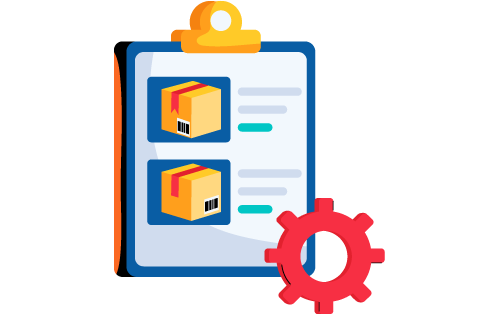How Could EDI Impact My Business?
Built For


- What EDI is
- How EDI works
- Business benefits of EDI
- Components of EDI
- EDI’s impact on order fulfillment
How Could EDI Impact My Business?

In today’s dynamic business world, staying competitive means embracing new technologies that streamline processes and improve efficiency. One such technology is Electronic Data Interchange or EDI for short. But what exactly is EDI, and how can it impact your business?
In this article, we’ll break down the basics of EDI, explore its benefits, and show you how it can transform your business. Understanding EDI could be the key to boosting your efficiency and staying ahead of the competition, whether you’re running a small business or managing a large enterprise. So, let’s begin and see how EDI can make a difference for you!
What is EDI?
Electronic Data Interchange (EDI) is a method for exchanging business documents between companies in a digital format. Imagine sending and receiving purchase orders, invoices, shipping notices, and other essential documents without touching a piece of paper or typing an email. That’s EDI in action!
Here’s how it works: EDI allows businesses to communicate information electronically in a structured, standardized way. When your company sends an order to a supplier, the information is automatically translated into a format that the supplier’s system can understand and process instantly. The same goes for receiving documents from other businesses—your system can automatically interpret and act on the information received.
EDI replaces traditional paper-based processes, which are often slow and prone to errors. By automating these transactions, EDI not only speeds up the exchange of information but also ensures that the data exchanged is accurate and consistent.
There are several types of documents commonly exchanged via EDI, including:
- Purchase Orders (POs): Requests to suppliers to provide products.
- Invoices: Bills sent from suppliers to buyers requesting payment for delivered goods or services.
- Advanced Shipping Notices (ASNs): Notifications that goods have been shipped and are on their way.
- Payment Remittance Advice: Notifications of payment details for invoices.
By adopting EDI, businesses can streamline operations, reduce errors, and improve efficiency. It’s a powerful tool modern companies leverage to stay competitive in today’s digital landscape.
Benefits of EDI for Businesses

So, why should you care about EDI? The benefits are plentiful, and they can make a significant difference in your business operations. Let’s break down some of the key advantages:
Increased Efficiency
One of EDI’s biggest perks is its ability to streamline business processes. By automating the exchange of documents, EDI reduces the need for manual data entry, which is not only time-consuming but also prone to errors. Imagine eliminating the tedious task of inputting data from paper documents or emails—EDI handles it all for you, allowing your staff to focus on more strategic tasks.
Cost Savings
EDI can also lead to substantial cost savings. Think about all the money spent on paper, printing, postage, and storage. With EDI, these costs are drastically reduced, if not eliminated. The efficiency gains mean you can do more with less, potentially decreasing labor costs.
Improved Accuracy and Speed
When it comes to business transactions, accuracy and speed are crucial. EDI ensures that the data exchanged between you and your trading partners is accurate and consistent, minimizing errors that can lead to costly mistakes. And because EDI transactions happen in real time, communication with suppliers and customers is quick – and faster transactions mean quicker turnarounds and improved customer satisfaction.
Enhanced Business Relationships
EDI benefits internal operations and strengthens relationships with suppliers and customers. By ensuring timely and accurate communications, EDI helps build trust and reliability. Suppliers appreciate prompt orders and payments, and customers enjoy faster delivery times and better service. In short, EDI helps create a smoother, more collaborative business environment.
Components of EDI
To fully understand the impact of EDI on your business, it’s essential to know its key components and how they work together. Here are the main elements of an EDI system:
EDI Standards
EDI relies on standardized formats to ensure all parties can read and process the exchanged documents. Common EDI standards include ANSI X12 (used in North America) and EDIFACT (used internationally). These standards define the content and structure of each type of document, such as purchase orders, invoices, and shipping notices, ensuring consistency and compatibility across different systems and industries.
EDI Translation Software
EDI software is the engine that drives your EDI system. It converts data from your internal system into the standard EDI format and vice versa.
Communication Network
The communication network is the backbone of your EDI system, facilitating the secure data exchange between trading partners.
EDI Management Software
Inventory and order software with EDI management capabilities provides tools designed to automate and streamline inventory tracking, order processing, and other essential business functions. By incorporating EDI management into your operations, you can achieve greater efficiency, accuracy, and productivity in your inventory and order management processes associated with EDI, ultimately enhancing your overall business performance.
Impact on Inventory Management
Effective inventory management is essential for businesses, and EDI can significantly improve this aspect of your operations. Here’s how:
Real-time Inventory Updates
With EDI, inventory levels are updated in real time. As soon as a transaction occurs—whether selling and shipping products via EDI or other channels, receiving goods, or adjusting stock levels—your inventory management system is instantly updated. This real-time visibility ensures that you always have accurate information about your stock levels, helping you make better purchasing and stocking decisions.
Improved Inventory Accuracy
Manual data entry is not only time-consuming but also prone to errors. These errors can lead to inaccurate inventory records, which can cause overstocking or stockouts. EDI eliminates the need for manual entry, reducing errors and improving inventory data accuracy. This accuracy helps you maintain the right balance of stock, avoiding excess inventory and shortages.
Better Demand Forecasting
Accurate and timely data enables better demand forecasting. By analyzing past transactions, current stock levels, and incoming orders, you can predict future demand more accurately. This means more effective inventory management, ensuring you have the right products in the right quantities at the right time. Improved demand forecasting leads to better customer satisfaction and optimized inventory costs.
Impact on Order Fulfillment

Order fulfillment is critical to any business, and EDI can significantly enhance this process. Here’s how EDI impacts order fulfillment:
Faster, More Accurate Order Processing
One of the standout benefits of EDI is the speed at which transactions are processed. When a customer places an order via EDI, the purchase order is received by your inventory and order management system, eliminating the need for manual entry. This automation speeds up the entire order processing cycle, allowing you to fulfill orders more quickly. Faster processing times mean your customers receive their products sooner, leading to higher satisfaction and repeat business.
Reduced Order Cycle Time
EDI drastically reduces the time between receiving an order and shipping it out. EDI enables real-time communication between your systems and those of your trading partners. This real-time data exchange ensures that orders are processed, picked, packed, and shipped without delay. The reduction in order cycle time improves efficiency and enhances your ability to meet tight delivery deadlines.
Improved Customer Satisfaction
EDI’s impact on order fulfillment directly translates to better customer service. Accurate and timely order processing means fewer errors and less delays, leading to a smoother and more reliable customer experience. Customers appreciate getting their orders on time and as expected, which boosts their overall satisfaction and increases repeat purchases and positive reviews.
EDI Case Study: Killer Bee Bait Streamlines Operations with EDI
Killer Bee Bait, a leading manufacturer and distributor of quality fishing lures and bait, has significantly improved its business operations through EDI.

Brent Gutierrez, President of Killer Bee Bait, shares how Acctivate inventory and order management software and EDI have transformed their order management process:
“A lot of the customers we have use EDI. EDI is another big feature for us because a lot of our chain store customers are on automatic reorder and those orders go straight into Acctivate. It saves literally hundreds of hours a year of manual entry in the system.”
Killer Bee Bait, known for its tagline “Bait With Attitude,” started in 1988 as an offshoot of a seafood processing business. Over the years, the company has grown to become one of the largest bait distributors in the United States. They’ve also expanded into lure manufacturing, selling products under brands like Erie Dearie, Carlson Offshore Tackle, and Hawg Hunter, available in over 380 stores nationwide.
As the business grew, managing inventory and orders became increasingly complex. Initially, they used separate accounting and warehouse management systems, which were not integrated, leading to significant challenges. According to Gutierrez:
“Because the warehouse management system was not integrated with the accounting system like Acctivate is with QuickBooks, keeping track of multiple locations and products was a nightmare. We had to keep track of each multiple location as an actual customer, creating a lot of accounting problems that had to be manually adjusted.”
With the expansion into lure manufacturing and a growing number of SKUs, Gutierrez realized the need for a more robust inventory system. They chose Acctivate for its advanced inventory features and seamless integration with QuickBooks.
“Acctivate gives me access to everything I need: I can see what’s going on with the customers, the inventory, etc. This provides the information I need to make decisions on a daily basis.”
In addition to improving inventory management, EDI has streamlined its order processing. Gutierrez explains:
“Big Box retailers are my biggest customers, and each of their orders can have up to hundreds of items on one order. Because of the amount of time EDI saves on data entry, it probably saves one employee who would do nothing but enter in sales orders.”
By integrating EDI services from TrueCommerce, Killer Bee Bait has automated the sales order entry process for their major customers, including Walmart®, Bass Pro Shops®, Mills Fleet Farm®, and Cabela’s®. This automation has saved time and enhanced accuracy and efficiency in order fulfillment.
Killer Bee Bait’s experience demonstrates the transformative impact of EDI and integrated inventory management software, highlighting significant time savings, improved accuracy, and better overall efficiency.
Call us at 817-870-1311





